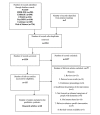Internet-Based Interventions Aimed at Supporting Family Caregivers of People With Dementia: Systematic Review
- PMID: 29895512
- PMCID: PMC6019848
- DOI: 10.2196/jmir.9548
Internet-Based Interventions Aimed at Supporting Family Caregivers of People With Dementia: Systematic Review
Abstract
Background: Caring for someone with dementia is one of the most challenging caring roles. The need for support for family caregivers has been recognized for some time but is often still lacking. With an aging population, demand on health and social care services is growing, and the population is increasingly looking to the internet for information and support.
Objective: In this review, we aimed to (1) identify the key components of existing internet-based interventions designed to support family caregivers of people with dementia, (2) develop an understanding of which components are most valued by caregivers, and (3) consider the evidence of effectiveness of internet-based interventions designed to support family caregivers of people with dementia.
Methods: We conducted a systematic search of online databases in April 2018. We searched reference lists and tracked citations. All study designs were included. We adopted a narrative synthesis approach with thematic analysis and tabulation as tools.
Results: We identified 2325 studies, of which we included 40. The interventions varied in the number and types of components, duration and dose, and outcomes used to measure effectiveness. The interventions focused on (1) contact with health or social care providers, (2) peer interaction, (3) provision of information, (4) decision support, and (5) psychological support. The overall quality of the studies was low, making interpretation and generalizability of the effectiveness findings difficult. However, most studies suggested that interventions may be beneficial to family caregiver well-being, including positive impacts on depression, anxiety, and burden. Particular benefit came from psychological support provided online, where several small randomized controlled trials suggested improvements in caregiver mental health. Provision of information online was most beneficial when tailored specifically for the individual and used as part of a multicomponent intervention. Peer support provided in online groups was appreciated by most participants and showed positive effects on stress. Finally, online contact with a professional was appreciated by caregivers, who valued easy access to personalized practical advice and emotional support, leading to a reduction in burden and strain.
Conclusions: Although mixed, the results indicate a positive response for the use of internet-based interventions by caregivers. More high-quality studies are required to identify the effectiveness of internet interventions aimed at supporting family caregivers, with particular focus on meeting the needs of caregivers during the different stages of dementia.
Keywords: caregivers; dementia; internet; review.
©Jenny Hopwood, Nina Walker, Lorraine McDonagh, Greta Rait, Kate Walters, Stephen Iliffe, Jamie Ross, Nathan Davies. Originally published in the Journal of Medical Internet Research (http://www.jmir.org), 12.06.2018.
Conflict of interest statement
Conflicts of Interest: None declared.
Figures
References
-
- Ory MG, Hoffman RR, Yee JL, Tennstedt S, Schulz R. Prevalence and impact of caregiving: a detailed comparison between dementia and nondementia caregivers. Gerontologist. 1999 Apr;39(2):177–85. - PubMed
-
- Alzheimer's Society . Dementia UK update. London, UK: Alzheimer's Society; 2014. Nov, [2018-05-24]. https://www.alzheimers.org.uk/sites/default/files/migrate/downloads/deme... .
-
- Alzheimer's Society Carer support. 2013. [2018-02-14]. https://www.alzheimers.org.uk/about-us/policy-and-influencing/what-we-th... .
Publication types
MeSH terms
Grants and funding
LinkOut - more resources
Full Text Sources
Other Literature Sources
Medical
Molecular Biology Databases
Miscellaneous


